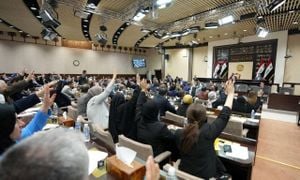Germany's 2025 federal election has resulted in a significant political shift, as the CDU/CSU coalition emerged victorious under the leadership of Friedrich Merz. The election, held on February 23, saw the CDU/CSU garner around 29 percent of the vote, marking their return to power and making Merz the next federal chancellor.
Merz celebrated the win, stating, "We have won this federal election 2025," indicating the clear support from the electorate for his party. The CDU/CSU's victory marks their return after previous losses, signaling potential policy changes moving forward.
Meanwhile, the right-wing AfD also made headlines by securing the second-largest share of votes with roughly 20 percent. Alice Weidel, the party's candidate, characterized their result as historic and emphasized the party's ambitions, claiming, "The people want a blue-black coalition," referring to the possibility of partnering with the CDU.
Conversely, the election results were dismal for the SPD and the Greens. The SPD, under Chancellor Olaf Scholz, suffered one of its worst defeats, garnering approximately 16 percent of the votes, the lowest for the party at any federal election. Scholz acknowledged the party's struggle, describing the outcome as "a bitter election result" and admitted responsibility for the losses. He stated, "This time the result was poor, and I bear responsibility for this election result."
Following closely, the Greens received about 12 percent of the vote, falling short of their ambitions. Robert Habeck, their candidate and former vice chancellor, expressed disappointment but was similarly proud of his party's recovery from previous lows. "We are proud of what we have achieved," he said, reflecting on the party's struggle following the dissolution of the coalition with the SPD and FDP last November.
The Free Democrats (FDP) faced criticism as they dropped below the necessary 5 percent threshold to secure representation, marking one of their most significant declines, with Christian Lindner announcing: "We need to change programmatically."
Another notable outcome was the resurgence of the Left Party, which gained support and increased its representation to around 8 percent, demonstrating resilience following prior electoral challenges. Jan van Aken from the Left Party proclaimed, "Left lives," reaffirming their role as the social opposition within the Bundestag.
High turnout was observed during this election, reaching about 84 percent—the highest since reunification. This highlights potential public engagement and interest, which could reshape future German politics. Overall, the election sent clear signals about the electorate's shifting mood, prompting significant stakes as political leaders prepare for negotiations on coalition formations.
With such contrasting dynamics at play, coalition scenarios present various possibilities going forward. Merz’s CDU could partner with any combination of the SPD, Greens, or potentially with influence from the AfD, though the latter remains contentious among traditional parties due to its right-wing agenda. Lindner noted the need for quick coalition talks and stated, "The world out there does not wait for lengthy negotiations."
Moving forward, the new government faces the challenge of restoring public trust and finding stability amid diverse political ideologies. The recent election not only reflects immediate public sentiment but sets the stage for Germany's future governance.



